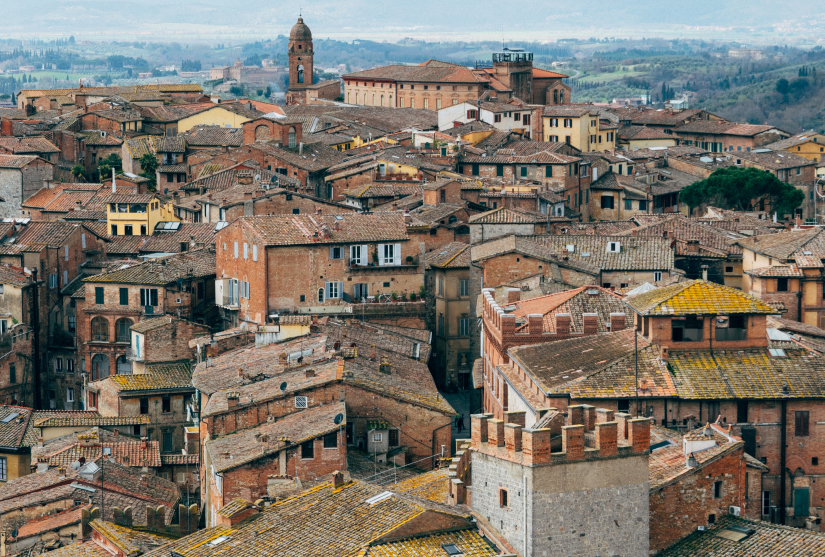Brody studies International Studies alongside her Bachelor of Nursing and spent her in-country study year in Italy.

By Brody Bamford, UTS Bachelor of Nursing Bachelor of Arts in International Studies student
Why did you choose to study the double degree?
Throughout school I always had a broad range of interests, across culture and languages, to maths and science, and I didn’t want to lock myself into a single degree discipline. I also knew that I wanted to be in a profession that would help the community and a role that would be needed anywhere.
UTS’s combined Nursing and International Studies degree was this perfect combination for me, and it allowed me to combine a practical nursing degree with other studies, which I hadn’t seen offered at any other university.
What do you learn that's different to the standard single degree program?
The addition of International Studies to the standard Bachelor of Nursing allows you to undertake language and foundational international studies classes, as well as your 12-month exchange.
During your year away you don’t study nursing. Instead, it’s an opportunity for you to attend classes in your target language and meet local students, improve your language skills, learn about another culture and complete a research project of your choosing.
I saw the in-country study (ICS) year as an opportunity to take a break from nursing, explore my other interests and push myself out of my comfort zone.
What was the highlight of your in-country study (ICS)?
There are too many highlights to think of just one! Making friends with people from not only Italy (my chosen language and host country) but from across Europe, the food and the opportunity to travel by myself and with other people are just some to name a few.
The challenge of learning another language and becoming confident in communicating with other people is also really fulfilling. Conducting a research project on a topic of my choosing with a methodology that I had completely devised myself, and producing interesting findings was also a proud moment for me.
Another highlight of this double degree for me has been the friendships I have made along the way.
There is a small cohort of double degree nursing students, but over the past five years we have become a close group of friends, travelling together during ICS, returning to Australia for our final nursing year and going through the pressure of new graduate interviews.
What skills did you learn in your overseas year that you believe will benefit your personal life and future career?
Living in another country and speaking another language for 12 months really improved my confidence in communicating with people, which is incredibly important in nursing. ICS is also an opportunity to take a break from your professional degree and find what else interests you, which opened my eyes to other career paths away from standard nursing, to public health policy and research.
Graduating with these two degrees not only gives you other options but spending the year away from home and your usual support system and having to deal with issues independently, makes you versatile and resilient.

How did university life overseas differ to Australia?
University in Italy is completely different to studying at UTS! There isn’t much student participation (like in UTS tutorials) and our university campus was an old converted monastery (the complete opposite to Building 2!). We would often sit in wooden benched lecture theatres for three hours a class, and there was no online work - everything was on paper and almost all of the final exams were oral exams where you respond to the professor’s course-based questions.
Initially, I found it exhausting to listen to 100% Italian for 3 hours straight, often not knowing what was going on. But It was easy to adjust as all the professors were kind and we never felt unwelcome.
How did you finance your ICS year? Any advice?
I was fortunate enough to be able to save for my ICS year away after working full time during my gap year and working while studying. Make the most of the first three years of your degree before going away and you’ll be surprised how much you can save! I also had many friends who used OS-HELP Loans while overseas which are added to your HECs.
I’d recommend doing some research and looking at the cost of living in the country you’ll be living in. Living in Italy isn’t as expensive as other European countries, but is much more so than other ICS choices like Mexico or Argentina.
What was your research project and why did you choose it?
I chose a topic external to healthcare and nursing for my ICS project so I could expand my research experience. The historic centre of Modena and the stories associated with it really intrigued me in my first few months of ICS so I decided for that to be my focus for my project.
Choose something that genuinely interests you because you’ll be studying it for the next 6-8 months! In the end, I chose to examine how historical walking tours of Modena’s historic centre influence residents' sense of place and contribute to the collective memory and stories of the city. I observed these tours, took photos and interviewed guides in Italian.
Learn more about my final research product [opens external site]
If you were going through a tough time (homesickness, university struggles) what support did you receive or access?
There will inevitably be times during ICS when you’re stressed or sick and just want to be back in your comfort zone in Australia with friends and family. Just remember that these times are when you learn the most about yourself and what you’re capable of.
I was sick a several times while away and even had a spritz spilled over my laptop which was filled with my research only 2 weeks out from my ICS project due date. It was my housemates and friends I made while away who supported me during these times, helped me arrange doctor's appointments and deal with Italian insurance (a nightmare!).
Make sure you reach out to others. Although friends and family back in Australia are half a world away, you can pick up the phone and call them which makes all the difference.
If you could redo your ICS, what are some things you would do differently?
I tried to get as much out of my ICS year as possible and I don’t think I would do anything differently! Try to make the most of every moment you have because even though 12 months seems like a long time, trust me, it isn’t.
Here are some tips I found helpful:
- Don’t live with other UTS students if possible! Live with people from the country you are in. It will be challenging and exhausting at first to communicate in your target language all day every day at first but living with an Italian housemate is what helped me most in developing my Italian language skills.
- Keep on top of your ICS assignments. Don’t leave them to the last minute because they aren’t just an essay you can start the night before. Reach out to your ICS supervisor if you’re struggling because they’re there to help.
- Travel, travel, travel! Whether you’re in Europe, Asia or South America make the most of the places around you and explore.
Why should International Studies students choose your country for their ICS?
Pizza, pasta, spritz, food!
There is so much do discover in Italy from the Dolomites to the Cinque Terre, and there is so much history to go with it. Everyone in the city I lived in (Modena) was welcoming and always willing to help even when I was trying to communicate in broken Italian, which made a huge difference.
From personal experience, I can also say that having a language like Italian under your belt also comes in handy in nursing when communicating with older patients with Italian backgrounds and making them feel safer, especially those with dementia or delirium.

